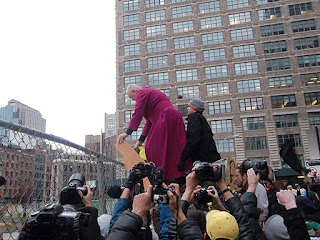 Retired Bishop Packard leads OWS over church barricade breaking down barriers between people of faith who seek peace and justice.
Retired Bishop Packard leads OWS over church barricade breaking down barriers between people of faith who seek peace and justice.How is the church responding to its primal horizontal ethical response to the current global and domestic nonviolent protests, namely a revolutionary emergence via the Occupy movements? Will the church faithful comprehend the current events while not dissociating from the real issues/people who are always remembered by God (vertical), the outcast, the suspects, the maltreated, the powerless, the oppressed, and the reviled who suffer outside the walls of the Christian church. Recalling here that “the church is the church only when it exists for others” (Dietrich Bonhoeffer, Letters and Papers from Prison).
Like the Korean church faithful, the American church faithful needs to develop its own comprehension of a Minjung theology that offers real promise for the ongoing enculturation of the gospel in our own land with today’s suffering and oppression by the dominant powers. The big question is whether the church faithful can truly comprehend with radical openness the reality of God’s reconciliation in Jesus Christ with the world, a reality that is presented as the hope of a great reversal during the Advent season (see The Magnificat).
Let the conversation begin and may justice flow down like waters (torrents) and righteousness like an ever-flowing stream.



